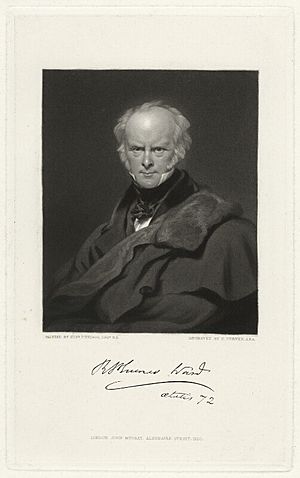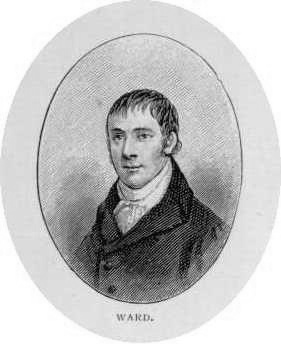Robert Plumer Ward facts for kids
Robert Ward, later known as Robert Plumer Ward from 1828, was an English lawyer, politician, and writer. He was born on March 19, 1765, and passed away on August 13, 1846. A famous politician, George Canning, once joked that Robert's law books were as fun to read as novels, but his novels were as boring as law books!
Contents
Robert Ward's Early Life and Education
Robert Ward was born in Mayfair, London. His father, John Ward, was a merchant and worked for the government in Gibraltar. His mother, Rebecca Raphael, came from a Sephardic Jewish family from Genoa, Italy.
Robert went to school at Walthamstow and then to Westminster School. After that, he studied at Christ Church, Oxford, starting in 1783. In 1785, he began training to become a lawyer at the Inner Temple.
Robert Ward's Career in Law and Politics
After finishing his studies, Robert Ward traveled in France during the early days of the French Revolution. In 1790, he officially became a qualified lawyer, which is called being "called to the bar."
An important moment in his career happened in 1794. He overheard some information about secret plans against the government. He quickly shared this information with a police magistrate, Richard Ford. Ford then took Robert directly to the Prime Minister, William Pitt the Younger. This meeting helped Robert make important connections in politics and law.
Thanks to these new connections, Robert started working on legal cases in the northern part of England. He also wrote legal papers for the government. He was offered a job as a judge in Nova Scotia (which is now part of Canada), but he didn't take it. Instead, in 1802, Prime Minister Pitt helped him get a guaranteed spot in the House of Commons. This meant Robert became a Member of Parliament (MP) for Cockermouth from 1802 to 1806. As an MP, he helped make laws for the country.
When Pitt became Prime Minister again in 1804, Robert Ward was given a job as an assistant in the government's foreign office, called the Under-Secretary of State for Foreign Affairs. He held this position until 1806. In 1807, he joined the Admiralty board, which was in charge of the navy.
Robert Ward was an MP for Haslemere from 1807 to 1823. In 1811, he became the Clerk of the Ordnance, a role where he managed military supplies and equipment. He wrote several reports about the state of military departments in Ireland and England.
Retirement and Later Life
In 1823, Robert Ward left Parliament and retired to his home, Hyde House, in Buckinghamshire. He wanted to focus on writing his novel, Tremaine, or The Man of Refinement.
In 1828, he married for the second time to Jane Plumer, who was a wealthy widow. When he married her, he added "Plumer" to his name, becoming Robert Plumer Ward. They lived at Gilston Park in Hertfordshire. In 1832, he was appointed High Sheriff of Hertfordshire, a ceremonial role for the county.
After his second wife passed away, he traveled abroad. In 1833, he married for a third time to Mary, the daughter of General Sir George Anson. They lived in London. Robert Plumer Ward died on August 13, 1846, at Chelsea Hospital, where his father-in-law was the governor.
Robert Ward's Writings
Robert Ward wrote both non-fiction (books based on facts) and fiction (novels). He also wrote several books about international law, which are rules that countries follow when dealing with each other.
Some of his important works include:
- A Treatise of the relative Rights and Duties of Belligerents and Neutral Powers in Maritime Affairs (1801): This book discussed the rights of countries during wartime, especially at sea.
- An Essay on Contraband (1801): This was a follow-up to his previous book, focusing on illegal goods during wartime.
- An Enquiry into the Manner in which the different Wars of Europe have commenced during the last two Centuries (1804 or 1805): This book looked at how wars in Europe started over 200 years.
- Tremaine; or, the Man of Refinement (1825): This was his first novel.
- De Vere; or, the Man of Independence (1827): Another novel, where some people believe the character Wentworth is based on the politician George Canning.
- Illustrations of Human Life (1837): A collection of stories.
- An Historical Essay on the real Character and Amount of the Precedent of the Revolution of 1688 (1838): A historical essay about the Glorious Revolution in England.
- Pictures of the World at Home and Abroad (1839): More stories and observations.
- De Clifford; or, the Constant Man (1841): His last novel.
After he passed away, his Memoirs of the Political and Literary Life of Robert Plumer Ward were published in 1850. These memoirs included parts of his diary and some of his unpublished essays.
Robert Ward's Family
Robert Ward was married three times:
- His first marriage was in 1796 to Catherine Julia Maling. Through this marriage, he became connected to the important Mulgrave family. Their son, Henry George Ward, became a diplomat and politician.
- His second marriage was in 1828 to Jane Plumer Lewin. She was a wealthy widow, and after their marriage, Robert added "Plumer" to his name. She passed away in 1831.
- His third marriage was in 1833 to Mary Anne Okeover. She was the daughter of General Sir George Anson.
Robert Ward was the grandfather of Dudley Ward, who became a judge. He was also the great-uncle of the famous theologian William George Ward.
 | Roy Wilkins |
 | John Lewis |
 | Linda Carol Brown |



